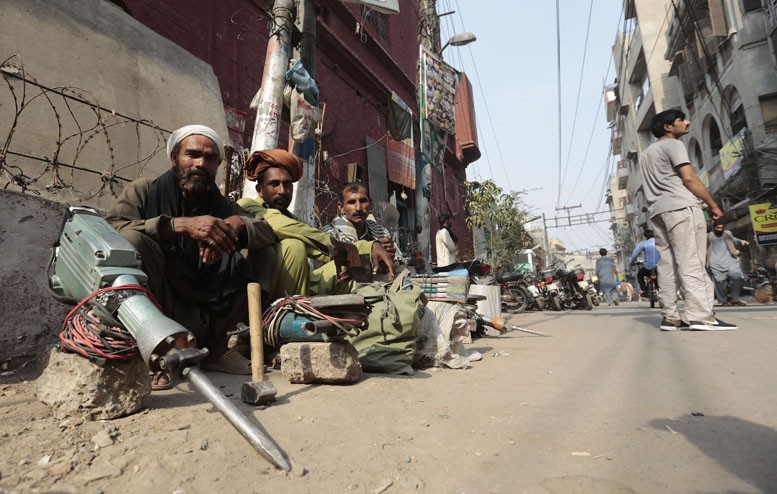
Ghulam Murtaza waits at Chauburji Chowk every morning, and contemplates the possibility of injury

It is early morning and the junction around the historic building of Chauburji in Lahore is already becoming busy. One can see labourers sitting on the roadside with construction tools lying next to them or resting against the shutters of shops that are yet to open.
There are similar gatherings of people at different points at the chowk. They are talking to each other but at the same time keeping an eye on the commuters and pedestrians approaching them. Whenever a vehicle stops near them, they rush towards it in anticipation of finding some work. Similar is the response in case someone approaches any of them and starts a conversation. These are the daily wagers (dehari dar) looking for potential employers.
Ghulam Murtaza, a young man in his late 20s from Burewala, is a labourer looking for work in Lahore. He says he had to leave his hometown because there are limited options there. He lives in a rented room shared by five more labourers. The rent is Rs6000 so the share per head comes to Rs1000 per month.
Murtaza started as an ordinary construction worker but today he falls in the category of masons. He can also paint. He is diversifying his skills because it is difficult to find work every day. "With a cap on development work by the government and an overall slowdown in business activity, there are few options left."
The standard rates quoted in these mini labour markets offering "chowk labour" are Rs1000 for an ordinary construction worker and Rs1500 for a mason, but they are often paid less than that. The painters expect around Rs1200. But what happens is that the contractor or their direct employer bargains with them and convinces them to work on much lower rates.
Murtaza says they do not find work every day so they agree to lower rates if they fail to convince their potential employers. "It is also difficult to get a fixed rate enforced because labourers are often hand to mouth and content with whatever they get," he adds. Besides, they are left to the mercy of market forces and do not fall in the ambit of labour laws. These labourers on average earn between Rs10,000 and Rs15,000 a month because they find work on few days of the month.
"We cut our costs to save money to send home," says Murtaza. He eats food offered at shrines, centres set up by philanthropists and business tycoons or at a religious seminary next to Chauburji. He has only two pairs of shalwar kameez and few belongings because he cannot keep much in a room shared by six people. For free medical treatment, he would go to government hospitals but now he is worried because this facility will no more be available for him. This is quite disturbing as construction workers are highly prone to injuries.
Also read: Of rude awakenings
"We do not waste time to get treatment for our injuries. This is important because the employer looks at us the way they look at a sacrificial animal and want us to be free of any injuries."
He says once his hand got injured and he had to wear a bandage. He could not find work that day as the contractor thought he would not be able to do justice with his work. The next day he removed the bandage and found work.